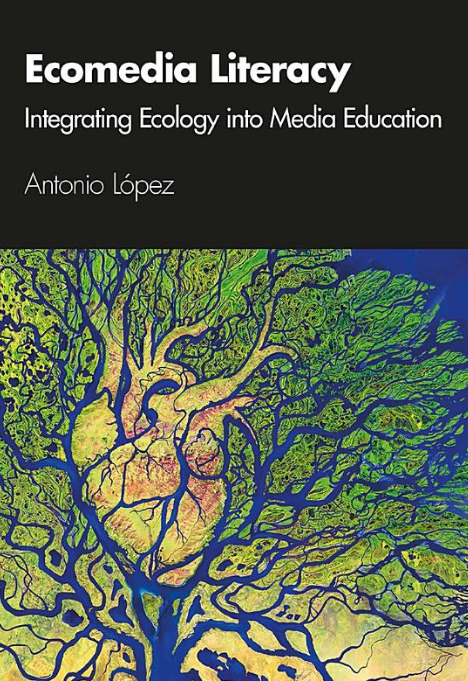Ecomedia Literacy: Professor Antonio Lopez to Publish New Book
JCU Communications Professor and Department Chair Antonio Lopez’s new book Ecomedia Literacy: Integrating Ecology into Media Education (Routledge, 2020) will be published in late November. ‘Ecomedia’ is a term developed in recent years to indicate the intersection between media, society, and the environment. According to the National Association of Media Literacy Education, “Media literacy empowers people to be critical thinkers and makers, effective communicators and active citizens.” Professor Lopez’s new book is the first of its kind to bridge both fields of study.
The Ecomedia Literacy book provides a guide to integrating the relationship between media and the environment (ecomedia) into media education. It gives media teachers essential tools, resources, and approaches that they can use in the classroom to “green their pedagogy” by connecting ecology, environmental communication, ecomedia studies, environmental humanities, and ecoliteracy to bridge media literacy and education for sustainability. “As media educators, we are obliged to expand our methodology and curriculum design to incorporate practical methods and solutions for integrating ecological awareness into our pedagogy,” explains Professor Lopez.
Professor Lopez has long been regarded as an international expert on media literacy. Because he observed that media education lacks resources about the environment, he developed the concept of ecomedia literacy. “I’ve been trying to spread environmental awareness to media educators for over a dozen years.” After extensive research on media literacy education organizations and practitioners, Professor Lopez found that one of the reasons why media educators don’t incorporate ecology into their teaching is because they are generally unaware of how media and the environment are interrelated, and they also need a guide for teaching about it. “In the early days when I was at conferences promoting these ideas, there was little interest. But in recent years more and more media teachers care about the climate crisis and ecology, so I wrote this book to help them bring those issues into their teaching.”
Ecomedia
Media have often been regarded as something immaterial, and therefore, with no impact on the environment. Yet, media are simultaneously part of the problem and the solution to climate chaos, biodiversity loss, ocean acidification, deforestation, water contamination, and many other environmental issues. According to Professor Lopez, “There are no media that are inseparable from their material conditions and the environment that produced them.”
In his book, Professor Lopez talks about the ‘ecomedia footprint,’ which is the material impact that media and technological gadgets have on the environment. He gives the example of cellphones, which contain various materials extracted from the earth, like copper, lithium, and cobalt, and that require electricity to be produced and to function. Server farms that run our apps and data generally depend on fossil fuel energy to power them, producing as much CO2 pollution as the airline industry on an annual basis. In addition, after a few years of being used, our gadgets are disposed of, producing an enormous crisis of e-waste in lower-income countries like Ghana, India, and China.
By ‘ecomedia mindprint,’ Professor Lopez indicates the way that information and communications technologies “influence how we define, act upon, and survive within the living planet.” He argues that mainstream media tend to propagate an ideology of unlimited growth and consumerism, which reinforces the belief that nature is separate from humans and that we can live beyond the limits of what ecosystems can provide to maintain our lifestyle. Moreover, tech companies conceal and ‘greenwash’ the environmental impact of our gadgets so that we remain unaware of their ecological damage.
Despite the scientifically-proven detrimental effects of human-produced greenhouse gas emissions on the planet, the fossil fuel industry continues to spread disinformation about climate science through social media and news media. According to Professor Lopez, remaining silent about the climate crisis leads to a normalization of unsustainable systems and ideologies, which is having devastating consequences for global ecosystems.
However, media can also raise awareness about environmental issues, help coordinate action, and provide easy access to numerous online resources such as documentaries, scientific reports, and news sources. “So, while the material and ideological impacts of digital media are major contributors to the global climate crisis, digital media also afford access to information, and produce the network effect of spreading and sharing information,” explains Professor Lopez. The solution to climate chaos is a paradigm shift to an ecological worldview that recognizes humans as interdependent with living systems and a shift in values from viewing the environment as purely instrumental to one in which it is imbued with intrinsic rights. “We need an economic system in service of ecology.” Media education should be connected to environmental literacy, and educators across disciplines should incorporate ecology into their work.
About Antonio Lopez
Professor Lopez is a leading international expert on media literacy education, and has published numerous articles and three previous books, namely, Mediacology: A multicultural approach to media literacy in the 21st century (Peter Lang, 2008), The Media Ecosystem: What ecology can teach us about responsible media practice (North Atlantic Books, 2012), and Greening Media Education: Bridging media literacy with green cultural citizenship (Peter Lang, 2014).







